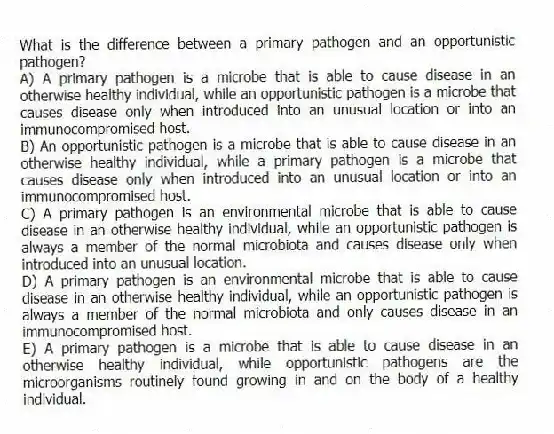
What is the difference between a primary pathogen and an opportunistic pathogen?
A) A primary pathogen is a microbe that is able to cause disease in an otherwise healthy individual, while an opportunistic pathogen is a microbe that causes disease only when introduced into an unusual location or into an immunocompromised host.
B) An opportunistic pathogen is a microbe that is able to cause disease in an otherwise healthy individual, while a primary pathogen is a microbe that causes disease only when introduced into an unusual location or into an immunocompromised host.
C) A primary pathogen is an environmental microbe that is able to cause disease in an otherwise healthy individual, while an opportunistic pathogen is always a member of the normal microbiota and causes disease only when introduced into an unusual location.
D) A primary pathogen is an environmental microbe that is able to cause disease in an otherwise healthy individual, while an opportunistic pathogen is always a member of the normal microbiota and only causes disease in an immunocompromised host.
E) A primary pathogen is a microbe that is able to cause disease in an otherwise healthy individual, while opportunistic pathogens are the microorganisms routinely found growing in and on the body of a healthy individual.
Correct Answer:
Verified
Q69: You think that Jay may have a
Q70: Is it a good strategy for a
Q71: Please select the False statement regarding viral
Q72: Which of the following is NOT a
Q73: Home-canned foods should be boiled before consumption
Q75: The period of time between exposure to
Q76: Select the INCORRECT definition regarding the progression
Q77: The length of the incubation period depends
Q78: You explain to Jay that infections and
Q79: You describe to Jay the initial events
Unlock this Answer For Free Now!
View this answer and more for free by performing one of the following actions

Scan the QR code to install the App and get 2 free unlocks

Unlock quizzes for free by uploading documents